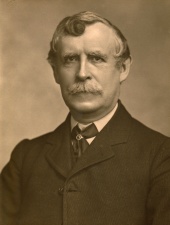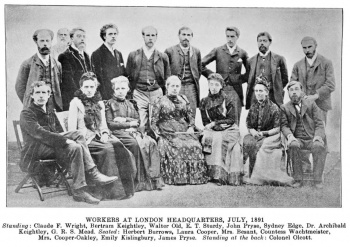Herbert Burrows
Herbert Burrows (June 12, 1845 – December 14, 1922) was a British socialist, social activist. and Theosophist. He had a longstanding friendship with Annie Besant with whom he organized the famous London matchgirls strike of 1888.
Personal life
Herbert Burrows was born on June 12, 1845 in Redgrave, Suffolk, England. His father Amos Burrows was a Chartist who sought political and social reforms. Herbert was self-educated and became a teacher. For a brief period he took classes at the University of Cambridge, but did not complete a degree. Later he took a position with the Inland Revenue Service dealing with excise taxes, until he retired in 1907.
In 1869, he married Mary Hannah Musk (1845–1889), and they had a son Horace and daughter Edith. The family moved to London in 1877. He died in London on December 14, 1922.
Social activism
As a supporter of suffrage (for men), labor unions, pacifism, temperance, and vegetarianism, Burrows was active in many radical groups and associations:
- National Secular Society
- Aristotelian Society
- Social and Political Education League
- Manhood Suffrage League
- Democratic Federation, later renamed Social Democratic Federation (SDF)
- Women's Trade Union League
- Women's Industrail Council
- South Place Ethical Society
- Rainbow Circle
- International Arbitration and Peace Association
- International Arbitration League
Through his association with Annie Besant and Charles Bradlaugh in the National Secular Society, Burrows became an organizer of the Bryant & May matchgirls' strike of 1888. He became treasurer of the Union of Women matchmakers.
Theosophical Society involvement
On May 10, 1889, Burrows accompanied his friend Annie Besant in a visit to Madame Blavatsky, who was then living at Landsdowne Road.[1] He was admitted to the Blavatsky Lodge of the Theosophical Society in London on May 21, 1889.[2] Later that year, he and Annie Besant attended a labor congress in Paris, and had a memorable visit with HPB in Fountainebleau:
In 1889 Annie Besant and I were with her in France at the Forest of Fountainebleau, and while there she went over with us in manuscript part of The Voice of the Silence. Looking back on that time, I remember that the passages over which she was most impressive were those which describe the toilsome ascent of the pilgrim-soul. In the copy of the book which she gave me and which will never leave me, she has written, "To Herbert Burrows, my old friend in another and better incarnation, from his ever-loving H.P.B." It may be that in those words lie part of the key to the life that we knew.[3]
For several years he spent time with Madame Blavatsky and the people in her household. He had to say of her:
Quickly I learned that the so-called charlatan and trickster was a noble soul, whose every day was spent in unselfish work, whose whole life was pure and simple as a child's, who counted never the cost of pain or toil, if these could advance the great cause to which her every energy was consecrated.[4]
Her absolute indifference to all outward forms was a true indifference based upon her inner spiritual knowledge of the verities of the universe. Setting by her when strangers came, as they often did from every corner of the earth, I have often watched with the keenest amusement their wonder at seeing a woman who always said what she thought. Given a prince and she would probably shock him, given a poor man and he would have her last shilling and her kindliest word.[5]
Burrows lectured on science and religion, "Spiritual Sociology," "Theosophical Ethics," and many other subjects; he also chaired lectures in which Annie Besant drew huge crowds. After HPB's death in 1891, Burrows continued working with the London Theosophists, but gradually became disenchanted with the organization. He found his own interpretations for events and the motivations of his coworkers:
Mrs. Besant Knows that both Col. Olcott and Mr. Sinnett believe Madame Blavatsky to have been fraudulent; but she has had as yet neither the moral courage nor the honesty to say so. On the contrary, she quotes them in Lucifer as the all-round staunch and firm upholders of H.P.B., while at the same time she upbraids those who wish the real truth known as besmirchers and practical traitors.[6]
He could not cite evidence that Annie Besant "knew" such a thing, or that Olcott ever failed in his devotion to and comradely love for Madame Blavatsky. Sinnett was jealous of the Mahatmas' favor for HPB, but did not consider her to be a fraud. Burrows repeated these same nebulous charges in Borderland [7]
In another letter to The English Theosophist dated October 2, 1895, Burrows accused Col. Olcott of "grave immorality," and of having an affair with Henrietta Muller, which was highly improbable. Burrows put his own spin on things. He resigned very publicly from the Theosophical Society late in 1895. That was not the end of his involvement, however. In 1907-1908, there was a scandal that followed Charles Webster Leadbeater encouraging some of his young assistants to masturbate (in lieu of seeking out prostitutes). Mrs. Besant let it be known that she would be willing to permit Leadbeater to remain a member of the TS. Burrows joined G. R. S. Mead and Edith Ward in writing a letter representing the minority view of English Theosophists who opposed Besant's view.[8]
Writings
Burrows wrote letters to the editors and articles for periodicals including Justice, The English Theosophist, Borderland, Light, and numerous others.
Pamphlets
- Theosophical Tract #3: Theosophy and Roman Catholicism. Pamphlet. c1892.
- Emerson's centenary: his thought and teaching. A South Place lecture. London: A. Bonner, 1903. 16 pages.
- The Future of Woman : a lecture delivered to the South Place Ethical Society, London, February 14th, 1909. London: Twentieth Century Press, 1909. No. 46 in series of Woman's suffrage pamphlets. Available at Hathitrust and Google Books.
Books
- Theosophical Essays. London, Benares : Theosophical Pub. Society, 1895. 220 pages. Various lectures and articles, with a short glossary of theosophical terms compiled by Annie Besant and Herbert Burrows (16 pages). Available at Hathitrust and Google Books.
- Zola. London: Swan Sonnenschein, 1899. Biography of novelist Emile Zola. Available at Hathitrust.
- Glossary of Theosophical Terms. London, Benares: Theosophical Publishing Society, 1906. Written with Annie Besant. Available at Hathitrust and Google Books.
- William Clarke; a collection of his writings, with a biographical sketch. Edited by Herbert Burrows and John A. Hobson. London: Swan Sonnenschein, 1908. Clarke was a British socialist activist, prominent in the Fabian Society. 420 pages. Available at Hathitrust.
Additional resources
- Herbert Burrows] in Wikipedia.
- Brief sketch of the life of Herbert Burrows, Socialist and Trade Unionist candidate. [London] [Twentieth Century Press], 1908. Bio from when Burrows stood for Parliament.
Notes
- ↑ Alexander Fullerton, "Reminiscences of the Early Days of American Section T. S. " The Theosophic Messenger 10 no.2 *November 1908): 37.
- ↑ Theosophical Society General Membership Register, 1875-1942 at http://tsmembers.org/. See book 1, entry 4986 (website file: 1B/54).
- ↑ Lucifer 8 (June, 1891): 301-302.
- ↑ "Concerning HPB" The Theosophist 27 no.7 (April, 1906): 510.
- ↑ Daniel H. Caldwell, The Occult World of Madame Blavatsky (Tucson, Arizona: Impossible Dream Publications, 1991), 272-273.
- ↑ Letter to the editor of The English Theosophist, quoted in The Path 10 No.10 (January, 1896): 328.
- ↑ "To the Editor of Borderland" The Light of the East 4 no.3(November, 1895): 67.
- ↑ "What Certain British Members Say about Mrs. Besant's Letter" Theosophic Voice 1 no.3 (November-January, 1908-1909): 81-82.

